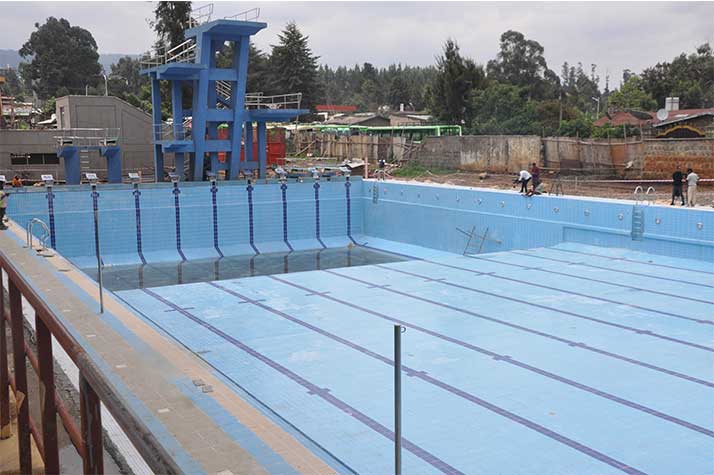
Amanuel Anjulo, 25 years old, sits perched on the metal gate of the parking lot across the street from the Federal Transport Authority on Gen. Abebe Damtew Street looking for cars passing by.
His work as parking security consists of helping drivers find a place to park if they do not want to be fined by traffic police and giving directions as cars come into the lot. He has a small stack of pink receipts in one hand that he exchanges with drivers for 10 Br and a tightly-rolled, yellow fabric face mask in the other. The latter is ready to be put on at the sight of the federal police, as Amanuel has learned the hard way.
"They caught me off guard last Tuesday as I was walking without a mask, and I got beaten for it," he said, adding that the neighbourhood police are far more friendly since they know the people in the area.
"It's the federal police you should watch out for," he warns. He has two masks that he bought on the roadside for 20 Br each and he wears one when he takes public transportation to and from work.
On top of protecting himself from the Novel Coronavirus (COVID-19), Amanuel wears a mask because of a provision of the state of emergency that mandates the use of masks in public areas. Issued on April 12, the decree outlaws moving around public areas without covering one's mouth and nose.
Weeks after the law came into effect, the Addis Abeba Police Commission in an abrupt move last Wednesday started apprehending people in order to ensure strict observance of the regulation among citizens.
The Commission has so far arrested over 4,000 individuals for not wearing mouth and nose coverings and violating the sanctioned physical distancing protocols this past Wednesday and Thursday. While penalties were in place for other offences set out in the regulation, like allowing more than 50pc capacity in public transport vehicles, the latest arrests are the first examples of the police's approach to maintaining the protocol.
"The responses have been very positive from people as we're ensuring their safety in this difficult time," said Fasika Fenta (Com.), communications head at the Addis Abeba Police Commission. "If anything, they've complained that we've been late in doing this."
The Commission is targeting areas with heavy traffic like bus and taxi stops and market areas.
"Though we have reported a great increase in observance of health protocols, the market in Janmeda is still proving a challenge to physical distancing measures," Fasika added.
The police's new approach is being introduced at a time when the number of confirmed Novel Coronavirus (COVID-19) cases soar higher in the country. Over the past month, the number of confirmed cases in Ethiopia jumped to three digits. The rate was growing slowly for the first five weeks but has picked up speed in the past two weeks.
Following the latest arrests, the Human Rights Commission has been receiving notifications through social media, messages and calls from families of people imprisoned who are protesting these punishments with a variety of complaints, according to Commissioner Daniel Bekele (PhD).
"Some have said they've been taken out of their private cars for not wearing masks, others manhandled, with reports of beatings at the hands of police," said Daniel.
The bus terminal in Megenagna is filled with people, most with face masks, on their way to catch a taxi or bus.
There are multiple responsibilities under the state of emergency and, though observance is mandatory, resorting to imprisonment is a step too far, according to the Commissioner.
"The issue emanates from the very laws stipulated under the state of emergency," he said. "They aren't in line with international human right standards and principles."
The Commission, after conducting an analysis of the regulation, submitted a series of recommendations last week to the government that it believes will help fill in some gaps.
One point of contention is that the laws resort to criminalising non-observance of safety protocols, according to Daniel.
"We need to replace criminal sanctions with civil ones, as this doesn't meet the principle of strict proportionality and necessity," he said. "Criminalising it coupled with the history of our police force leaves room for abuse. We need to focus on informing the public first."
Raising awareness and ensuring strict observance has been one of the tasks prioritised under the Ministry of Health, but the results have been unsatisfactory, claims the Ministry's officials.
"We're are that point when people have become less vigilant, and that needs to be curtailed immediately," said Tegene Regassa (PhD), the Ministry's public relations and communications director.
The fear is that even though confirmed cases of COVID-19 in the country are increasing, the relatively low numbers in contrast with other countries might create a false sense of security that results in an unnecessary loss of life, according to him.
The Ministry has also been engaged in strengthening its testing capacity. This has been supplemented by the door-to-door temperature test implemented across the city and different regions. The country now has 25 testing laboratories with the capacity to test 6,000 samples a day.
"We're focused on doubling the number of laboratories in the country," said Tegene, "but our biggest task lies in changing the attitude of the society."
Increasing testing capacity is not expected to have the desired effect if containment measures are not being followed. People need to stay home as much as possible and strictly follow guidelines when they are out, according to Tegene.
Despite the number of cases reaching 306 as of Saturday, the city is getting busier by the day. Businesses have reopened, more people can be seen on the streets than a couple of weeks ago, and many cars are now back on the road. Health guideline observance has also varied across the board.
Louvre Grand Hotel & Restaurant is one eatery that reopened its doors for its patrons after three weeks of being closed. The Hotel has had to cut down on its capacity for customers by more than 50pc in compliance with physical distancing rules.
But reopening was done out of financial necessity, according to Thomas Boutonnet, the Hotel's customer relations manager.
The Hotel is operating with 15 of its 55 staff and continues to pay all its employees based on certain agreed percentages. Only three people are allowed at a table and patrons are discouraged from sitting too close to one another regardless of whether they are coming from the same house or not, an excuse the staff has had to decline.
"We understand the risks associated with re-opening, but we still have to pay staff and have other costs to cover," said Thomas, who adds that their staff is well informed and communicate with customers on keeping their physical distance. "Since we don't deal with a lot of customers, it hasn't been a big problem."
Tomoca Coffee, another establishment that had briefly closed its doors, has more customers as of late, and coffee lovers can be seen arriving at peak hours during the morning and at lunch.
Safety precautions are not optional for employees and while they follow guidelines strictly with supervisors patrolling frequently, convincing patrons is another issue, according to COO Kiroubel Seyoum.
"We have sanitising stations placed around the coffee shop, and we encourage our customers not to stay too long after having their coffee," he said.
However, patrons have been lax in following the rules, and old habits of talking or sitting too closely have yet to wear off.
It is not only cafes and restaurants that have been dealing with hiccups in compliance with guidelines, but government offices as well. The Addis Abeba Revenues Bureau, which operates with 2,600 employees in the city, has started one of its busier months.
Customers declare Value Added Tax (VAT) and withholding taxes in May, and the Bureau has recalled workers back to their desks, especially those dealing directly with customers like ushers and cashiers. The Bureau had been operating in shifts, availing specific services on set days to minimise the number of customers present at one time.
It has provided necessary resources like hand sanitiser and masks to every employee, but compliance leaves a lot to be desired, according to Belayneh W. Senbet, communications team leader at the Bureau.
"We've noticed that there needs to be more effort in some branches," he said. "Initially, employees wore masks, but they're neglecting this as of late."
Complacency seems to have come along with the age-old adage that people tend to fear what they don't know, according to Azeb Asaminew (MD), a psychiatrist leading the mental and psycho-social support team on the Advisory Council for COVID-19.
Initially, there was fear and people were extremely wary during the first cases in the country, according to Azeb. However, as time has gone on, people have grown accustomed to the news.
"We may not fully grasp the reality," she said, "but by the time we do, the disease will be very hard to contain."
The Civil Service Commission is another government office that is recalling employees.
While the initial cut in its staff had impacted the efficiency of the Commission's services, this was mitigated by a corresponding dip in the number of customers it needed to serve, according to Alebachew Alemu, representative of the Commission's communication department.
The Commission, which oversees 171,933 public servants across the country, is focusing on the departments that serve customers directly, especially those working in administrative issues.
The office has a washing station outside its building, and masks are mandatory for anyone entering the office premises. There are posters indicating that people must wash their hands and wear masks.
Adhering to health guidelines requires not only knowing what the rules and regulations are but also having the proper attitude, according to Azeb.
"While we need to contextualise our way of implementing successful strategies from elsewhere," she said, "we also need to modify the messages to bring about behavioural changes since repetition can desensitise us."
Azeb also stresses that public health measures should go hand in hand with proper awareness-raising in the community, and there needs to be more clarification on the rules in place.
"Everyone knows wearing masks is important, but clarification should be given on how we wear those masks, who needs to wear them, and where we wear them - these are the issues that need further promotion," she said. "We have to be creative with how we create awareness."
Experts in health and human rights strongly advise the authorities to present the message of wearing a mask in a creative way before taking aggressive actions.
Amanuel, the parking attendant, continues wearing the masks whenever he sees police out of fear of being beaten or arrested.
PUBLISHED ON
May 16,2020 [ VOL
21 , NO
1046]

Fortune News | May 27,2023

Sponsored Contents | Aug 22,2022

Fortune News | Nov 23,2019

Advertorials | Jun 05,2023


Dec 22 , 2024 . By TIZITA SHEWAFERAW
Charged with transforming colossal state-owned enterprises into modern and competitiv...

Aug 18 , 2024 . By AKSAH ITALO
Although predictable Yonas Zerihun's job in the ride-hailing service is not immune to...

Jul 28 , 2024 . By TIZITA SHEWAFERAW
Unhabitual, perhaps too many, Samuel Gebreyohannes, 38, used to occasionally enjoy a couple of beers at breakfast. However, he recently swit...

Jul 13 , 2024 . By AKSAH ITALO
Investors who rely on tractors, trucks, and field vehicles for commuting, transporting commodities, and f...

Jul 12 , 2025
Political leaders and their policy advisors often promise great leaps forward, yet th...

Jul 5 , 2025
Six years ago, Ethiopia was the darling of international liberal commentators. A year...

Jun 28 , 2025
Meseret Damtie, the assertive auditor general, has never been shy about naming names...

Jun 21 , 2025
A well-worn adage says, “Budget is not destiny, but it is direction.” Examining t...